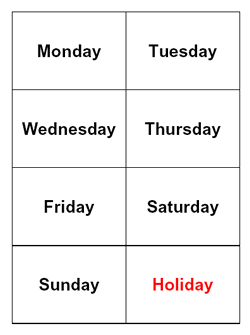Skip over navigation
This is a game for two players.
You will need a set of the snap cards between you. For the set, you'll need to print off seven copies of this Word document or this pdf. Cut out the cards and take out two of the holiday cards so you're left with forty nine days of the week cards and five holiday cards.

Share the cards out face down.
Take turns to turn over a card and add it to a pile in the middle.
Say 'snap' if the two cards are days which are next to each other in the week, like Saturday and Sunday.
Whoever says 'snap' first picks up the whole pile and puts them on the bottom of their own.
If you turn over a holiday card then you must both say 'holiday' instead. Whoever says it first picks up the pile.
You could change the rules so that there has to be one day in between the two cards for you to say 'snap'.
Perhaps you can make up your own rules too? Please let us know what works well.

Or search by topic
Number and algebra
Geometry and measure
Probability and statistics
Working mathematically
Advanced mathematics
For younger learners
Snap
Age 5 to 7
Challenge Level 





- Problem
- Getting Started
- Student Solutions
- Teachers' Resources
Snap
This is a game for two players.
You will need a set of the snap cards between you. For the set, you'll need to print off seven copies of this Word document or this pdf. Cut out the cards and take out two of the holiday cards so you're left with forty nine days of the week cards and five holiday cards.

Share the cards out face down.
Take turns to turn over a card and add it to a pile in the middle.
Say 'snap' if the two cards are days which are next to each other in the week, like Saturday and Sunday.
Whoever says 'snap' first picks up the whole pile and puts them on the bottom of their own.
If you turn over a holiday card then you must both say 'holiday' instead. Whoever says it first picks up the pile.
You could change the rules so that there has to be one day in between the two cards for you to say 'snap'.
Perhaps you can make up your own rules too? Please let us know what works well.
Why play this game?
As they play this version of Snap , children will be using everyday language related to time as well as ordering and sequencing.
Possible approach
This game could be played by pairs of children for different purposes. You could introduce them to it before you begin a topic on time so that you can gauge how familiar they are with the days of the week and their sequencing. Alternatively, you could use it as an assessment after some work on time.
Either way, as children are playing in pairs, encourage them to make sure they agree whether a snap is correct or not and listen out for those who are able to explain their reasoning clearly to their partner. You could bring them together for a whole group discussion, using examples of situations that have caused difficulty for some pairs.
Of course it would be great for this game to be available in the classroom for children to choose to play at suitable opportunites as well.
Key questions
How do you know that's a 'snap'?
Possible extension
You could add some information cards which say things such as "the day after Sunday" or "two days before Monday". Children could be given blank cards to create some information cards of their own.
Possible support
As an initial activity, children could make their own diary page where they had to sequence the days of the week. They could then refer to it as necessary as they played the game.
You may also like
Biscuit Decorations
Andrew decorated 20 biscuits to take to a party. He lined them up and put icing on every second biscuit and different decorations on other biscuits. How many biscuits weren't decorated?

